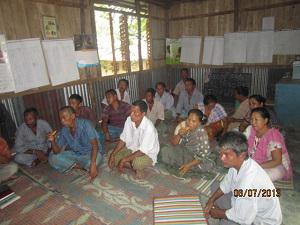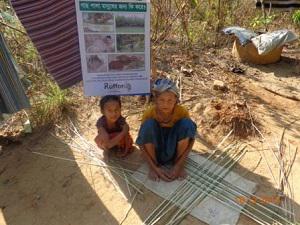Md. Danesh Miah
Other projects
The project aims at visualizing of trade-offs between forest conservation and livelihoods of the forest dependent peoples and vulnerability of livelihoods of the community people.
Reducing emissions from deforestation and forest degradation, and enhancing forest carbon stocks (REDD+) can generate cost-effective quick mitigation of climate change. It can simultaneously address climate change and rural poverty, while conserving biodiversity and sustaining vital ecosystem services. The research aims to explore the forest biodiversity use of peoples living inside the forests in Chittagong Hill tracts (CHTs) of Bangladesh. Trade-offs between forest conservation and livelihoods in the arena of REDD+ will be carefully judged. Identification of trade-offs between forest biodiversity use and carbon benefits will contribute to sharing the carbon benefits with the forest peoples. Identifying alternative livelihoods will be important for diverting forest dependent peoples from overusing the natural forests.

Focus Group Discussion.
All of these will contribute adopting REDD+ program in the selected forest areas of Bangladesh along with the conservation of forest biodiversity and livelihood development of the forest dependent peoples.

Women weaving basket by bamboo and cane.
The study will be conducted in Khagrachhari Sadar Upazila (Local government unit under a district) and Dighinala Upazila of Khagrachari district under Chittagong Hill Tracts (CHT) of Bangladesh through stratified random sampling technique. The ultimate sampling unit will be households in villages and the corresponding tropical semi-evergreen forests. The study/program will be conducted from March 2013 to February 2014 involving a complementary ethnographic analysis and socially and culturally sensitive TEK (Traditional Ecological Knowledge) gathering method. The study will include physical observation and ethnographic field notes. However, it will consist of structured and semi-structured data gathering of community-based information.
For the study, TEK of three tribal communities, Chakma, Tripura and Marma living inside the tropical semi-evergreen forests will be sampled purposively. Based on the abundance of the populations, the Chakma and the Tripura will be sampled from Dighinala Upazila and the Marma will be sampled from Khagrachhari Sadar Upazila. From each of the strata, three villages will be selected randomly. From each of the villages, 20 households will be randomly selected for the study. Thus, the total sampling size will be 120. A reconnaissance survey in March 2013 will be the first step to obtain an overview of the forests and ethnic communities in the Khagrachari district of the Chittagong Hill Tracts of Bangladesh. The final survey will be carried out from April 2013 to October 2013.